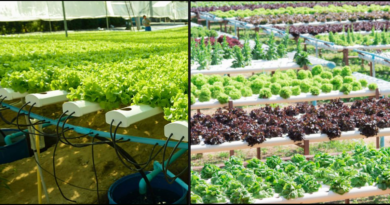BLOCKCHAIN REVOLUTION: Organic Agriculture Transparency

Introduction:
A revolution in efficiency, sustainability, and transparency is currently taking place in the agriculture sector, thanks to the use of cutting-edge technology. Blockchain has become one of these technologies that is really useful, especially when it comes to supply chains and organic farming. The function of blockchain in agriculture is examined in this article, with a special focus on how it guarantees accurate definitions, benefits stakeholders, improves transparency, and creates traceability in the organic supply chain.
Defining blockchain:

Blockchain is a distributed, decentralized digital ledger system that securely and impenetrably records transactions over a network of computers. It is made up of a series of blocks, each of which carries a timestamp, a list of transactions, and a cryptographic hash of the block before it. Ensuring the integrity and immutability of the recorded data is made possible by the cryptographic connections that strengthen the chain’s durability against changes.
A blockchain may be defined more simply as an ever-expanding chain of blocks, each of which contains a transparent and safe record of transactions. Because blockchain is decentralized and has strong cryptographic properties, it may be used for a variety of purposes outside of cryptocurrencies. It also removes the need for a central authority.
Defining Organic in the Blockchain Era
A significant obstacle facing the organic supply chain has been the absence of agreed-upon criteria for what qualifies as “organic.” Blockchain technologyhttps://en.wikipedia.org/wiki/Blockchain can help with this problem by offering an immutable, decentralized ledger that documents each step of a product’s journey.
The blockchain allows for the recording of every stage of the organic supply chain, including seed generation, growing, harvesting, processing, and distribution. Smart contracts, which are self-executing agreements encoded directly into code, have the ability to enforce commitments to organic regulations. This guarantees that across the supply chain, the word “organic” has the same meaning.
Benefits of Blockchain in Agriculture:
Here are the benefits of implementing blockchain technology in organic agriculture:
Validation of Provenance:
Blockchain technology offers an unchangeable log of every stage involved in the manufacturing and distribution process. This provides a transparent picture of the full lifespan and guarantees that organic food can be tracked back to its source. The integrity of organic certificates depends on this provenance verification.
Smart Contracts:
Organic farming may automate compliance procedures by using smart contracts, which are self-executing contracts with the contents of the agreement directly encoded into code. This lowers the possibility of fraud and preserves the integrity of organic goods by guaranteeing that all parties concerned follow the established requirements.
Effective Certification Procedures:
The conventional methods of certifying organic products can be laborious and prone to mistakes. Blockchain makes these procedures more efficient by safely storing important information like pest management techniques, crop rotation schedules, and soil test outcomes. This improves accuracy while also accelerating certification.
Cost savings via automation:
Smart contracts save costs by automating a number of procedures, from certification to payment, which eliminates the need for middlemen and their related expenses. Because of this technology, processes are streamlined, and organic farming is now more profitable for both farmers and consumers.
Decentralized Data Management:
Blockchain’s decentralized ledger ensures that data is not controlled by a single entity. The organic supply chain’s total information dependability is improved, and its risk of manipulation is mainly reduced by this readily available method to data management.
Real-Time Monitoring of Conditions:
Blockchain-enabled Internet of Things (IoT) devices allow for real-time environmental condition monitoring, including humidity and temperature. This guarantees that organic productshttps://en.wikipedia.org/wiki/Organic_product are handled and sent in the best possible ways, preserving their quality all the way through the supply chain.
Enhanced Market Access:
Blockchain provides simpler access to international markets for small-scale and local organic producers. Due to the transparent and verifiable nature of blockchain data, it may be possible for organic producers to reach a wider audience by gaining the trust of foreign purchasers.
Market differentiation and branding:
Blockchain gives organic farmers the ability to distinguish themselves from the competition by offering unquestionable proof of their following organic standards. This boosts their branding efforts by drawing in customers who respect authenticity and are concerned about the environment.
Improved supply chain resilience:
Blockchain’s resilience to tampering and cyber threats enhances the overall resilience of the organic supply chain. This is especially important during emergencies or other disturbances because it preserves data integrity and makes the system more resilient and dependable.
Reporting and Compliance with Regulations:
Blockchain keeps an accurate and auditable record of all actions, which makes regulatory compliance easier. This lessens the paperwork that farmers must do while also guaranteeing that the whole organic supply chain conforms to the constantly changing regulations.
These new advantages highlight blockchain technology’s revolutionary potential in fostering sustainability, effectiveness, and trust in the organic agricultural industry as it develops.
Transparency in the Organic Supply Chain:
Transparency in the context of organic farming refers to the freely available and transparent disclosure of data on the cultivation, handling, and sale of organic goods. The inclusion of blockchain technology facilitates and enhances transparency, resulting in a paradigm shift in our understanding of and interactions with organic supply chains.
Consumer Confidence:
With the use of blockchain technology, customers may obtain up-to-date details on the organic produce’s path from the farm to the store. Customers are better able to confirm the veracity of organic claims and make values-aligned decisions when there is openness, which fosters trust.
Data sharing among stakeholders:
The decentralized structure of blockchain technology enables the safe exchange of data between many parties in the organic supply chain, such as retailers, distributors, farmers, and regulatory agencies. All parties involved will always have access to correct and current information thanks to this transparent collaboration.
Consumer Empowerment and Informed Choices:
Customers are better equipped to make decisions that are consistent with their beliefs when there is transparency. Through obtaining comprehensive details about the organic products they buy, customers may encourage moral and environmentally friendly behavior, creating a demand for open and accountable organic supply chains.
Building Trust in the Organic Brand:
Consumers and organic brands may trust each other more since blockchain data is transparent and verifiable. A transparent supply chain gives organic farmers more legitimacy and a competitive edge in a market where sustainability and authenticity become more and more important.
In summary, trust, sustainability, and moral behavior are all reliant on the organic supply chain’s openness, which blockchain technology makes possible. The use of blockchain technology guarantees that the organic agricultural sector stays at the forefront of providing dependable and genuine products to a mindful customer base, in line with the growing trend of consumers prioritizing transparency in their purchase decisions.
Traceability in the Organic Supply Chain:
A key component of the organic supply chain is traceability, and when it is implemented well, it is revolutionizing the way we track, oversee, and guarantee the integrity of organic products from production to consumption. Traceability, as it relates to organic agriculture Practices for Organic Farming and Water Conservation, is the capacity to track a product’s path across the whole supply chain. With blockchain technology, traceability may be improved significantly. It offers a transparent and safe framework for tracking and validating each stage of the organic production and distribution process.
Origin, Verification, and Provenance:
Blockchain ensures that the provenance of organic goods is fully documented and cannot be altered. Customers may obtain information about the farm where the food originated, including specifics about growth techniques, soil conditions, and adherence to organic standards, through traceability, which allows them to confirm the veracity of organic claims.
Batch-Level Tracking:
In the organic supply chain, traceability extends to the level of batch-level data, going beyond simple product tracking. Blockchain enables the tracking of individual organic product batches, facilitating prompt detection and remediation in the event of contamination or quality problems. By ensuring targeted responses instead of bulk recalls, this reduces waste and protects consumer health.
Transportation and Storage Monitoring:
The quality and integrity of food can be affected by the transportation and storage processes involved in the journey of organic items. Stakeholders can keep an eye on and confirm the conditions under which items are stored and moved, thanks to blockchain-enabled traceability. By being transparent, organic products are guaranteed to reach customers in the best possible condition, preserving their organic identity.
Real-Time Updates on Processing:
Processing facilities that convert organic raw materials into final goods are included in the scope of traceability. Real-time updates on each processing step are made possible by blockchain, insuring that the transformation meets organic requirements. For the finished result to be organic, this degree of stimulation is crucial.
Efficient Recall Management:
Blockchain-enabled traceability makes it possible to quickly and precisely identify impacted items in the case of a recall. This focused recall management lessens the effect on customers, lowers company losses, and safeguards the organic brand’s image.
Compliance and Certification Tracking:
Adhering strictly to certain norms is necessary for organic certification. The use of blockchain traceability guarantees that all parties involved in the supply chain meet the necessary certification standards. This expedites compliance inspections and promotes an accountable culture by making the auditing process for regulators and certification agencies simple.
Continuous Improvement through Data Insights:
The blockchain-stored traceability data offers important insights into the organic supply chain. Stakeholders may use this data analysis to pinpoint problem areas, streamline workflows, and boost productivity all around.
Blockchain technology’s capacity to provide traceability in the organic supply chain is crucial for guaranteeing the sustainability, quality, and authenticity of organic goods. The growing consumer consciousness and desire for products made ethically and with traceability is driving the use of blockchain technology, which acts as a catalyst for an organic supply chain that is more transparent, responsible, and resilient.
Conclusion:
Blockchain technology is revolutionizing the agricultural industry, especially when it comes to guaranteeing standards, reaping advantages, improving transparency, and creating traceability in the organic food chain. As we commemorate the one-year anniversary of blockchain’s introduction into agriculture, it is evident that this technology is planting the seeds for organic farming to become a more transparent and sustainable industry.





Pingback: Vertical Farming: Challenges and Sustainable Future...
Pingback: Organic Kitchen Garden: Tech Tips from Apps to Smart Planter